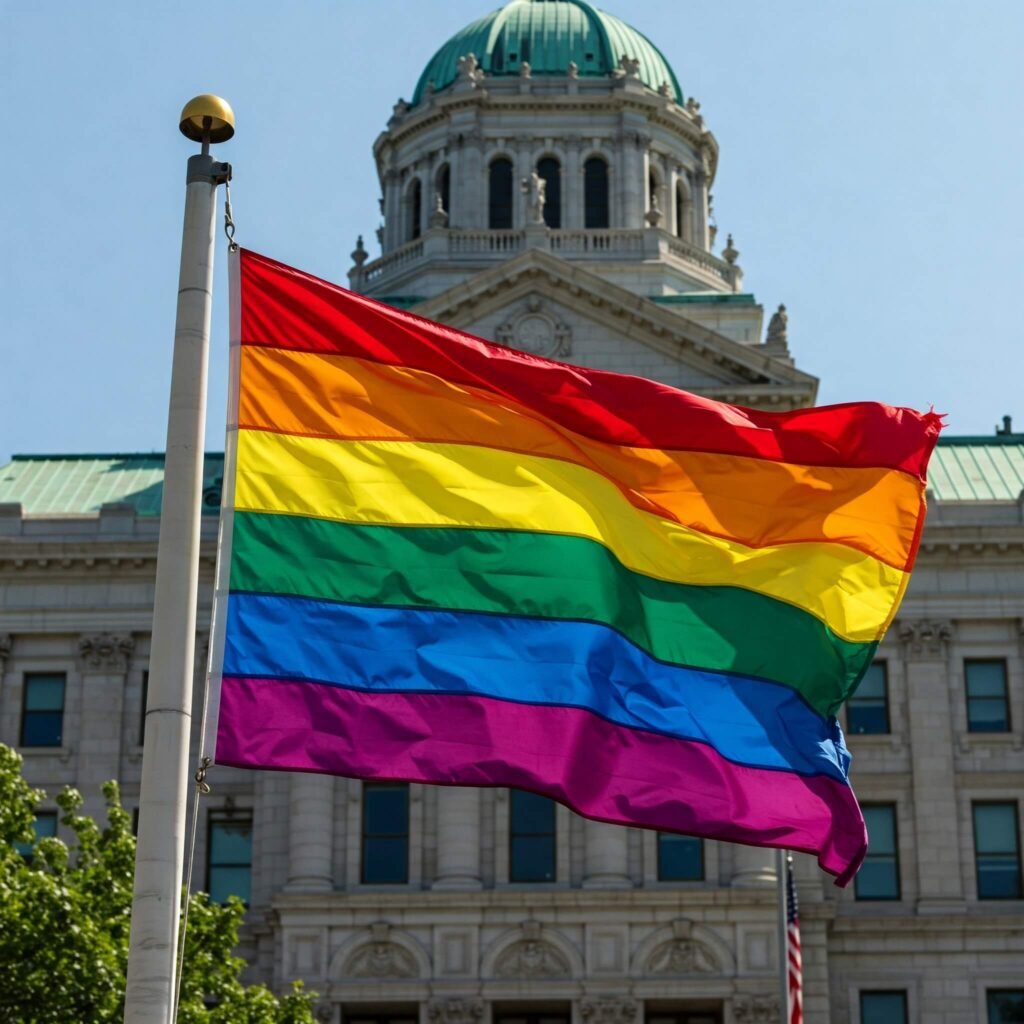The journey toward equality for the LGBTQ+ community has been marked by significant legal victories that have reshaped laws and societal norms. These legal wins for LGBTQ+ rights have dismantled discriminatory practices and affirmed the dignity of millions. In this blog, we’ll explore five landmark U.S. Supreme Court cases that stand as pillars of progress, offering insights into their impact and why they matter today. Whether you’re an advocate, ally, or simply curious, these milestones are essential to understand.

Why Legal Wins for LGBTQ+ Rights Matter
Legal victories are more than just court rulings—they’re turning points that redefine what’s possible for the LGBTQ+ community. These legal wins for LGBTQ+ rights have struck down oppressive laws, secured protections, and set precedents for future battles. They show how advocacy, courage, and the law can come together to create lasting change.
- Historical Context: Before these rulings, same-sex relationships were criminalized in some states, and discrimination was rampant.
- Ongoing Relevance: These wins continue to influence policies and inspire global movements for equality.
Outbound Link: Learn more about the broader impact of these cases at the Human Rights Campaign.
1. Obergefell v. Hodges (2015): Legalizing Same-Sex Marriage
In a historic 5-4 decision, Obergefell v. Hodges made same-sex marriage legal across all 50 states, a monumental legal win for LGBTQ+ rights. Justice Anthony Kennedy’s majority opinion emphasized that denying marriage equality violates the Constitution’s guarantee of equal protection.
Why It’s a Game-Changer
- Nationwide Impact: Couples like Jim Obergefell, who fought for recognition of his marriage after his husband’s death, gained federal benefits and protections.
- Cultural Shift: The ruling normalized same-sex unions, fostering greater societal acceptance.
Real-World Example: After the decision, states like Texas, which previously banned same-sex marriage, saw thousands of couples tie the knot, celebrating newfound rights.

Outbound Link: Read the full Obergefell decision at Justia.
2. Bostock v. Clayton County (2020): Workplace Protections
The Bostock v. Clayton County ruling declared that discrimination based on sexual orientation or gender identity is illegal under Title VII of the Civil Rights Act of 1964. This 6-3 decision was a landmark legal win for LGBTQ+ rights, protecting employees from workplace discrimination.
Key Takeaways
- Broad Scope: The ruling applies to hiring, firing, promotions, and workplace policies.
- Unexpected Ally: Justice Neil Gorsuch, a conservative, authored the majority opinion, highlighting the law’s clarity.
Data Insight: A 2021 survey by the Williams Institute found that 20% of LGBTQ+ workers faced workplace discrimination before Bostock, underscoring the ruling’s necessity.
Outbound Link: Explore workplace equality resources at the ACLU.
3. Lawrence v. Texas (2003): Decriminalizing Same-Sex Relationships
Before 2003, sodomy laws in several states criminalized same-sex relationships. Lawrence v. Texas struck down these laws as unconstitutional, a critical legal win for LGBTQ+ rights that affirmed personal privacy and dignity.
Why It Matters
- Legal Precedent: The 6-3 ruling overturned Bowers v. Hardwick (1986), which upheld sodomy laws.
- Personal Freedom: It protected individuals like John Lawrence and Tyron Garner, arrested in their home, from state intrusion.
Actionable Takeaway: Share this story to highlight how recent these freedoms are—many younger generations may not realize same-sex relationships were once illegal in parts of the U.S.

4. United States v. Windsor (2013): Federal Recognition of Same-Sex Marriage
The United States v. Windsor decision struck down Section 3 of the Defense of Marriage Act (DOMA), which defined marriage as between a man and a woman. This legal win for LGBTQ+ rights ensured same-sex couples received federal benefits, like tax exemptions.
Impact and Legacy
- Financial Equity: Edith Windsor’s fight for a tax refund after her wife’s death saved her $363,000 and set a precedent.
- Paving the Way: Windsor laid the groundwork for Obergefell two years later.
Outbound Link: Dive into Windsor’s story at Lambda Legal.
5. Romer v. Evans (1996): Striking Down Discriminatory Amendments
Romer v. Evans was the first major Supreme Court victory for LGBTQ+ rights, invalidating Colorado’s Amendment 2, which banned local governments from protecting gay and lesbian individuals from discrimination. This legal win for LGBTQ+ rights set a crucial precedent.
Why It’s Significant
- Equal Protection: The 6-3 ruling, authored by Justice Kennedy, affirmed that laws targeting specific groups violate equal protection.
- Early Victory: It empowered activists and laid the foundation for future cases like Lawrence and Obergefell.
Real-World Example: After Romer, cities like Denver could enact anti-discrimination ordinances, protecting LGBTQ+ residents from housing and job discrimination.
How These Legal Wins Shape the Future
These legal wins for LGBTQ+ rights are not just history—they’re blueprints for ongoing advocacy. They remind us that progress is possible but fragile, especially with recent challenges like the 2023 web designer case. Here’s how you can engage:
- Stay Informed: Follow organizations like Lambda Legal and the ACLU for updates on LGBTQ+ rights.
- Advocate Locally: Support policies that protect LGBTQ+ individuals in your community.
- Amplify Stories: Share these victories to educate others about the fight for equality.
Conclusion
The top 5 legal wins for LGBTQ+ rights—Romer, Lawrence, Windsor, Obergefell, and Bostock—have transformed lives and laws, ensuring greater equality and dignity. These victories show the power of persistence and the importance of protecting hard-won rights. By understanding and sharing these milestones, we can all contribute to a more inclusive future.


























